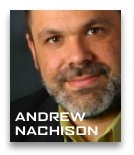Freakamedia: The limits of the connected culture
 As the UK economy suffers its worst crisis in 60 years and some of the world’s biggest private financial institutions crumble beneath the crash of the U.S. housing market, we can’t help but reflect on the notion of enlightened anxiety.
As the UK economy suffers its worst crisis in 60 years and some of the world’s biggest private financial institutions crumble beneath the crash of the U.S. housing market, we can’t help but reflect on the notion of enlightened anxiety.
That’s a phrase Dale used in the introduction to our original We Media report, published more than five years ago. It’s the sick feeling you get when you put together what you know with what you don’t know. It’s the downside of the connected society: we have access to more information than ever and it makes us crazy.
For instance: You’ve heard that massive investment institutions such as Lehman Brothers, Merrill Lynch and AIG have their fingers in just about everything. They’ve somehow amassed tens of billions of dollars in losses due to investments in things related to home loans. Some of these “things” are called mortgage-backed securities. Maybe six months ago you caught wind of AIG’s woes – auditors warned of them. Reuters, Bloomberg and others reported the findings. Or maybe you ignored it. After all, what are you supposed to do when auditors question accounting methods and asset valuations at a banking insurance company? And what, exactly, are housing-related securities? Who buys and sells them and why are the world’s financiers and governments freaking out over them? Should you be freaking out? What’s next to fall? Your bank, your retirement savings, your home or your government?
Sorry, the FAQ at Merrill Lynch doesn’t help with those kinds of questions. But who does? Will We Media help dig us out from this or any crisis, or is that asking too much of everyone? That’s old-fashioned dig, by the way. You won’t find references to any of these questions among the top posts on the website Digg in the last 24 hours, 7 days, 30 days or year.
So dig further. Today, your favorite big media brand is flush with play-by-play reports and day-after analysis of who’s involved in the housing-banking-crumbling economy story, and why some companies are too important to fail but others are not. Yours? Probably not. MSNBC asks, “What does the Crisis Mean for You?” and an economist answers: “At this point it’s really, really hard to see how things are going to sort out … Clearly, these are very uncertain times…”
Clearly.
For all that we know, there seems to be an equal and opposing counterforce of all that we do not know. So we’re all freaking out. Three years ago Steven Leavitt and Stephen Dubner wrote a book called Freakonomics to describe the strange disconnect between financial assumptions, risks and reality. What they called “the hidden side of everything” might just as easliy be called freakamedia. Information rains down on us from media everywhere, but there’s still a hidden side to everything.
Investor and serial entrepreneur Mark Andreesen, most recently founder of the social network Ning, wrote four months ago in his blog, “High-quality business journalism is distinctly the exception, not the rule; every CEO knows it, and the noise from inaccurate bad press can again actually damage your company.”
He reflects a deep-seeded distrust of media – borne out by our research that has found a vast majority of Americans are unsatisfied with the quality of their journalism.
But We Media is everyone – journalism from big institutions, alerts from governments, research from activists and insights from individuals empowered to produce, share, distribute and act on information produced by everyone. The gaps between information, knowledge and action remain wide, at least for our biggest challenges. We Media didn’t help the world avoid a housing slump in the U.S. and Europe, or wars in Iraq, Afghanistan, Georgia and Darfur. While the opportunities to change the world through media produced by everyone remain limitless, the results, so far, have been distinctly limited.



